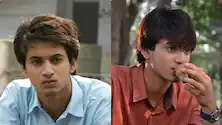Chitra Palekar on Maati Maay
By:
Moses
Navgire,
IndiFM
Tuesday,
October
10,
2006
Born
in
Dharwad
town
in
Karnataka
in
India,
Chitra
Palekar
completed
her
degree
in
Economics
from
St.
Xavier's
College
in
Mumbai
in
1968.
She
was
however,
the
lead
actor
and
director
in
avant-garde
theatre
in
Mumbai
since
1967.
Chitra
was
also
the
producer
and
lead
actress
in
the
Marathi
feature
film
Aakriet
(Misbegotten),
1981,
which
won
the
Special
Jury
Award
at
Nantes,
France.
She
was
also
the
Screenplay
and
Dialogue
writer
of
the
film
Kairee
(The
Raw
Mango),
1999,
which
was
directed
by
Amol
Palekar.
And
after
making
an
English
documentary
Portrait
Of
A
Visionary
in
2002,
Chitra
Palekar
has
made
her
first
feature
film
Maati
Maay,
(A
Grave-keeper's
Tale)
starring
Nandita
Das
and
Atul
Kulkarni
in
lead
roles.
The
film
was
highly
appreciated
at
Toronto
Film
Festival
and
will
be
releasing
in
theatres
in
Mumbai
soon.
Maati
Maay
is
your
first
feature
film.
Tell
us
about
it
The
film
is
based
on
a
short
story
by
Mahasweta
Devi
and
the
lead
actors
of
the
film
are
Atul
Kulkarni,
Nandita
Das
and
Kshitij
Gawade.
The
theme
of
the
film
is
about
a
woman
who
works
in
a
graveyard
and
her
job
is
of
burying
the
dead
bodies'
of
small
children;
it
has
been
an
ancestral
legacy.
However,
when
she
herself
becomes
a
mother,
she
doesn't
want
to
continue
with
the
work.
But
no
one
understands
her
emotional
and
physical
state.
The
society
simply
forces
her
to
continue
with
the
work
because
no
one
else
is
ready
to
do
it.
But
when
she
ultimately
rebels,
the
society
punishes
her
as
the
society
does
not
accept
people
who
break
its
rules
and
traditions.
The
film
talks
about,
not
only
the
relationship
between
human
beings
and
their
relationship
with
the
society
but
also
how
injustice
is
inflicted
on
a
woman
by
the
society.
The
woman
in
the
film
is
not
only
ill-treated
by
the
society
but
also
her
own
people
betray
and
trap
her.
Can
you
explain
the
title
Maati
Maay
?
Maati
Maay
are
two
separate
words
in
Marathi.
The
word
"Maati" has
many
connotations.
Maati
means
soil,
it
also
means
burying
and
Maati
also
has
the
meaning
of
destruction.
On
the
other
hand
"Maay"
means
Mother.
So,
the
film
is
about
a
woman
who
is
doing
the
job
of
burying
the
dead
children
and
when
she
becomes
a
mother
and
she
denies
continuing
with
the
job,
the
society
accuses
her
of
being
a
Witch.
In
English,
I've
named
the
film
"A
Grave-keeper's
Tale".
I
have
produced,
written
and
directed
this
film.
This
film
will
also
mark
my
directorial
debut.
What
inspired
you
to
make
this
film?
To
me,
the
film
seemed
to
have
the
possibility
of
being
visually
beautiful.
But
also,
the
fact
is
that
I
have
always
been
concerned
about
the
issues
relating
to
women.
Besides,
this
story
deals
with
a
woman
as
a
young
mother
and
speaks
about
her
conflict,
her
dilemma,
her
rebellion
and
finally
how
society
and
the
people
around
her
cheat
her.
These
were
some
of
the
issues
that
were
always
of
concern
to
me
and
therefore
I
decided
to
go
ahead
and
make
the
film.
How
was
the
experience
of
shooting
the
film
since
it
is
set
and
shot
in
a
rural
background?
Which
Village
was
it
shot
in?
This
film
was
shot
near
Amravati
which
is
in
the
Northern
part
of
Maharashtra.
No
feature
film
was
ever
been
shot
over
there
before
and
therefore
the
locations
were
almost
virgin.
But
the
experience
was
very
beautiful.
My
entire
unit
and
the
actors
were
extremely
cooperative
and
not
only
that,
even
the
villagers
and
everybody
around
were
delighted
that
a
feature
film
was
being
shot
at
that
place.
Another
interesting
feature
of
this
film
is
that
apart
from
Atul
Kulkarni
and
Nandita
Das,
all
the
supporting
cast,
including
the
young
boy
Kshitij
Gawade,
who
has
a
very
crucial
role
in
the
film
were
facing
the
camera
for
the
first
time.
They
are
mainly
local
theatre
artists
from
Amravati
and
Nagpur.
Was
it
challenging
for
you
as
a
director
to
shoot
the
film
in
such
a
remote
location?
Not
really.
Because
I
think
that
if
you
do
your
homework
properly,
you
won't
face
much
of
a
problem.
Besides
me,
my
assistants,
including
the
cameraman
and
other
crew
members
had
all
visited
the
location
before
beginning
with
the
shooting
schedule.
We
knew
what
the
problems
there
were
and
we
took
care
of
everything
well
in
advance.
So,
there
weren't
any
problems
as
such.
But
yes,
the
climate
there
was
very
hot
and
we
were
doing
a
one
schedule
film
without
any
breaks.
So,
that
way
it
was
very
challenging
for
the
crew.
How
was
it
working
with
Nandita
Das
and
Atul
Kulkarni?
Oh,
it
was
wonderful.
Both
Nandita
and
Atul
are
absolute
professionals
and
it
is
a
pleasure
working
with
such
professionals.
They
would
come
on
sets
absolutely
prepared.
Besides,
as
Nandita
was
doing
a
Marathi
film,
she
would
come
prepared
with
her
dialogues
and
even
Atul
helped
her
a
lot.
They
used
to
rehearse
every
scene.
Everyone
used
to
take
each
others
suggestions
positively.
And
since
the
entire
cast
and
crew
was
so
friendly,
shooting
this
film
was
like
a
big
picnic.
Wasn't
the
story
originally
supposed
to
be
a
play
but
it
ended
up
becoming
a
movie?
No,
it
was
not
like
that.
A
friend
of
mine
just
suggested
me
to
read
the
story
and
see
if
I
could
make
it
into
a
play.
But
then
when
I
read
the
story
I
thought
that
it
would
better
be
made
into
a
film.
It
is
not
that
I
had
planned
to
make
it
into
a
play
or
anything
like
that.
Does
this
film
have
music?
It
doesn't
have
songs
as
such
but
it
has
fabulous
background
score
which
is
designed
by
Bhaskar
Chandavarkar.
He
is
a
western
music
director
from
Pune.
So
then
doesn't
the
film
have
a
traditional
folk
music?
Interestingly,
we
discussed
and
decided
not
to
have
folk
and
traditional
kind
of
music
for
the
film.
The
music
instead
is
mood
oriented
and
it
is
a
kind
of
music
that
goes
beyond
geographical
boundaries
or
local
culture.
It
is
very
abstract
but
it
enhances
the
mood
and
brings
out
the
theme
of
the
film.
Films
like
this
don't
make
it
big
at
the
Box
Office
as
they
are
mostly
meant
for
festivals
and
not
the
masses?
It's
nothing
like
that;
let
me
explain
this
to
you.
There's
nothing
like
a
festival
film
or
a
Box
office
film.
Any
film
well
made
will
be
appreciated
by
the
audiences.
The
issue
is
how
you
take
it
to
the
audiences.
Because
what
happens
is
that
when
you
sell
the
film
there
are
many
people
in
between
like
distributors
and
exhibitors
and
sometimes
it
becomes
a
bit
difficult
to
convince
them.
But
now
with
the
multiplexes
coming
up
and
distribution
system
changing
so
much,
there
isn't
much
of
a
problem
nowadays.
For
example,
I
have
released
the
film
in
Pune
on
Friday,
October
7,
and
I've
released
both
the
Marathi
print
and
the
subtitled
print
across
the
city,
which
is
a
sort
of
an
experiment
and
I'm
sure
it'll
succeed
as
the
film
goes
beyond
the
Marathi
region.
It
is
a
story
about
an
Indian
woman
and
her
dilemma
and
conflict.
Hence,
this
goes
beyond
the
restrictions
of
narrow
local
boundaries.
So
if
we
ask
you
the
target
audiences
of
the
film...
...they
will
be
everybody.
For
the
simple
reason
that
I
don't
like
to
differentiate
between
the
audiences.
I've
never
said
that
a
particular
film
is
for
the
classes
and
the
other
is
for
the
masses.
Who
am
I
to
decide
that?
Besides
this
differentiation
is
very
subjective.
When
I
make
a
film,
first
and
foremost
it
has
to
satisfy
me.
And
when
that
happens
I
would
want
everyone
to
watch
it.
I
cannot
decide
who
may
or
who
may
not
understand
the
film.
Maati
Maay
is
a
complex
story
but
it
is
not
very
difficult
to
understand.
The
film
is
emotional
and
dramatic
and
people
like
drama
don't
they?
It
is
a
kind
of
story
that
will
not
only
touch
the
audience's
heart
but
also
their
mind
and
make
them
think.
So,
I
do
hope
that
everybody
watches
the
film.
What
kind
of
release
is
the
film
having
in
India?
When
is
it
coming
in
Mumbai
and
rest
if
India?
The
film
has
released
in
Pune.
In
November,
I
am
releasing
the
film
in
Mumbai.
I've
already
talked
with
people
in
Chennai
and
other
Metropolitan
cities
and
we
will
soon
decide
when
to
release
the
film
in
other
parts
of
India.
How
do
you
plan
to
market
this
film?
I
have
been
talking
about
the
film
and
my
actors
have
been
talking
about
the
film
and
also
there
is
lot
of
curiosity
about
the
film
among
the
press.
So,
whatever
I
can,
I'm
doing
that
to
take
this
film
to
the
people.
And
like
it
happened
at
Toronto
Film
Festival,
I
had
no
publicist
there
and
no
one
to
really
push
the
film
but
after
the
press
screening
people
started
talking
about
it
and
there
was
lot
of
mouth
publicity.
All
the
shows
were
sold
out.
I'm
sure
that
the
same
will
happen
in
India.
I
don't
say
that
marketing
is
not
important
but
if
I
really
believe
in
my
product,
I
don't
think
I
need
to
create
any
hype.
A
good
product
gets
viewed
and
I
believe
in
it.
How
was
the
response
at
the
Toronto
film
festival?
It
was
a
wonderful
experience
at
Toronto.
People
there,
which
include
not
only
the
Indian
audiences
but
also
the
Canadians
and
other
international
audiences,
were
touched
by
watching
the
film.
They
didn't
have
any
difficulty
in
understanding
the
film
and
they
really
appreciated
it.
That's
what
they
told
me
during
the
question-answer
round
after
the
film's
screening.
The
film
will
also
be
screened
at
the
London
Film
Festival.
Deepa
Mehta
too
complimented
you
for
the
film.
Yea,
Deepa
Mehta
and
many
other
filmmakers
from
Canada
and
other
countries
complimented
me
for
the
film.
Deepa
really
liked
the
film
and
she
did
send
me
a
message
complimenting
my
work.
I
was
very
happy,
as
this
is
my
first
film
as
a
director.
Besides,
Deepa
has
done
many
films
before.
So,
it
feels
very
nice
when
a
colleague
appreciates
your
work
as
it
pushes
you
to
do
even
better.
Have
you
seen
Amol
Palekar's
Quest?
No,
I've
been
busy
with
my
own
preparations.
Finally,
what
are
your
expectations
from
Maati
Maay?
My
intention
is
to
make
this
a
huge
commercial
and
creative
success.
And
now,
it
is
up
to
the
audiences
to
make
it
a
commercial
success.
But
believe
me,
whatever
is
the
result,
I
am
very
satisfied
with
the
film
and
that
cannot
be
changed.




 Click it and Unblock the Notifications
Click it and Unblock the Notifications























